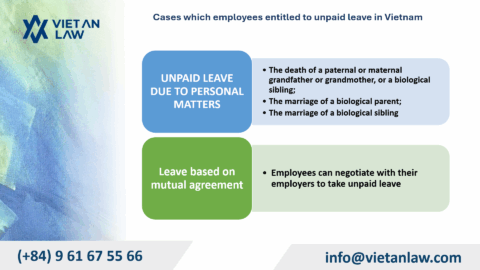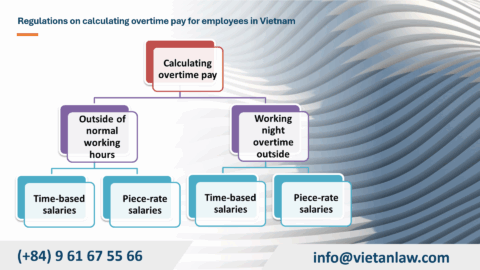During the implementation of the labor contract, for many different reasons, there may be violations between the subjects, whether employees or employers, in the implementation of labor rights and obligations, leading to liability for damages. So how is the procedure for claiming labor contract compensation carried out? In this article, Viet An Law will advise on procedures for claiming compensation for labor contract in Vietnam.
Compensation in a labor contract is understood as the legal responsibility of the employee or employer when there is an act that directly or indirectly causes damage to the other party under the labor contract. Thus, the subjects responsible for compensation are the parties in the labor relationship, which can be the employee or the employer.
Compensation for employees based on material liability is regulated in Article 129 of the Labor Code 2019 as a form of labor discipline. The order and procedures for handling requests for compensation from employees are specifically guided in Article 71 of Decree 145/2020/ND-CP, including the following steps:
When an employee is discovered to have damaged or lost tools/equipment, lost the employer’s property or other property assigned by the employer, or committed other acts that cause damage to the employer’s assets or the consumption of materials exceeds the allowable limit, the employer requires the employee to report in writing about the incident.
Meeting attendees include:
Notification time: At least 05 working days before holding the meeting to handle compensation for damages, the employer shall notify the parties who must attend the meeting including regulatory parties, and appraisers about the price (if any). Notification must ensure that these components receive notice before the meeting takes place.
Upon receiving notice from the employer, the parties required to attend the meeting must confirm their attendance at the meeting with the employer. In case one of the participants cannot attend the meeting at the announced time and location, the employee and the employer shall agree to change the meeting time and location; In case the two parties cannot agree, the employer decides the time and place of the meeting.
The employer conducts a meeting to handle compensation for damages according to the notified time and location.
In case one of the participants required to attend the meeting does not confirm attendance or is absent, the employer will still conduct the meeting to handle compensation for damages according to the provisions of the law.
The content of the meeting to handle damage compensation must be recorded in minutes, approved before the end of the meeting, and signed by the meeting attendees. In case someone does not sign the record, the person recording the record must clearly state their full name and reason for not signing (if any) in the content of the record.
The decision to handle compensation for damages must be issued within the statute of limitations for handling compensation for damages. The decision to handle compensation for damage must clearly state the level of damage; cause of damage; level of compensation for damages; a time limit, and form of compensation and be sent to the parties that must attend the meeting.
When the parties’ claim for compensation is not resolved or disputes or conflicts arise, the parties can proceed to resolve the dispute by claiming compensation by the following methods:
Negotiation is the method by which the parties resolve the problem themselves. The parties make proposals and decide to resolve the issue themselves without the help of a third party. Resolving compensation disputes through negotiation creates flexibility because it is not bound by legal procedures. At the same time, promoting freedom of will and the right to decide for the parties. However, this is not a mandatory procedure, so the parties can skip negotiations to request dispute resolution according to legal procedures.
If direct negotiation involves only two parties, mediation involves the participation of a third party, the Labor Mediator. The order and procedures for mediation of individual labor disputes by labor conciliators are specified in Article 188 of the Labor Code 2019.
Step 1: The parties submit the request.
The disputing parties can send their petition to the labor conciliator or the specialized labor agency under the Provincial People’s Committee. The specialized labor agency under the People’s Committee is the focal point for receiving requests to resolve labor disputes and is responsible for classifying, guiding, supporting, and assisting parties in resolving labor disputes.
Step 2: The mediator proceeds to resolve the request
Within 05 working days from the date the labor conciliator receives a request from the party requesting dispute resolution or from a specialized agency, the labor conciliator must finish the mediation.
At the mediation meeting, both disputing parties must be present. The disputing parties may authorize another person to participate in the mediation session.
Labor conciliators are responsible for guiding and supporting the parties in negotiating to resolve disputes.
Disputes over compensation are resolved by labor arbitration in the following cases:
The order and procedures for resolving disputes by the Labor Arbitration Council are specified in Article 189 of the Labor Code 2019. Specifically, these steps include:
Step 1: The parties submit the request.
Disputing parties can submit a request for resolution to the Labor Arbitration Council. The Labor Arbitration Council is established by the decision of the Chairman of the Provincial People’s Committee with a term of 5 years.
Step 2: The Labor Arbitration Council resolves the request.
Within 07 working days from the date of receipt of the request for dispute resolution, a Labor Arbitration Board must be established to resolve the dispute.
Within 30 days from the date the Labor Arbitration Board is established, the Labor Arbitration Board must issue a decision on dispute resolution and send it to the disputing parties.
The court has jurisdiction to resolve labor contract damage compensation disputes in the following cases:
The procedures for resolving disputes in Court are conducted according to the provisions of the Civil Procedure Code 2015 on resolving civil cases.
If you have any related questions or need advice on compensation for labor contract in Vietnam, please contact Viet An Law for the best support!




